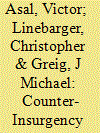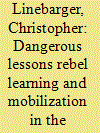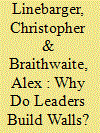|
|
|
Sort Order |
|
|
|
Items / Page
|
|
|
|
|
|
|
| Srl | Item |
| 1 |
ID:
193100


|
|
|
|
|
| Summary/Abstract |
International attacks by rebel groups are an historically important phenomenon. Yet, few scholars have sought to understand why some rebel organizations “go abroad” and commence international attacks and some do not. We theorize that a rebel group’s decision to attack internationally is partly the result of its home-state’s counter-insurgency strategy. Home-states that employ broad-based repression discourage rebels from engaging in international attacks. By contrast, home-states that employ narrowly targeted repression accelerate rebel decisions to attack internationally. Finally, concessions by the home-state are a sufficient condition for the rebel groups in our data to never attack internationally.
|
|
|
|
|
|
|
|
|
|
|
|
|
|
|
|
| 2 |
ID:
147833


|
|
|
|
|
| Summary/Abstract |
Contemporary research on the international diffusion of civil conflict privileges physical, proximity-based variables like conflict spillover and refugee flows. I argue that the international diffusion of civil strife can occur through a learning mechanism, and that this phenomenon may occur on a worldwide basis. Individuals most likely to rebel, or proto-rebels, may learn about the utility of rebellion before mobilizing and violently challenging the state. Such international learning therefore occurs during the pre-conflict process. International sources by which proto-rebels learn include active, ongoing civil wars, as well as revolutionary governments that have been founded by rebels victorious in past wars. Revolutionary governments radically shock the international system, teaching proto-rebels about the possible benefits to be gained from violently challenging the state. In order to test these assertions, I undertake empirical analyses using militant organization data that capture the year in which rebel movements first emerge, during the period 1968–2001. I then explore the spatial and temporal relationships between rebel movement emergence, civil conflict, and revolutionary regimes, using the country-year as my unit of analysis. I further examine how these relationships are attenuated by cultural and regime-type similarity. I find, in line with the literature, that active civil conflicts generally inspire rebel mobilization only in directly neighboring states, while revolutionary regimes established after rebel victories are associated with mobilization on a global basis. I conclude that proto-rebels learn and take inspiration from some global sources of information, and that significant analytical utility is to be gained by focusing on revolutionary regimes established as a result of rebel victories, as well as mobilization in the pre-conflict process.
|
|
|
|
|
|
|
|
|
|
|
|
|
|
|
|
| 3 |
ID:
135897


|
|
|
|
|
| Summary/Abstract |
Much research disputes the president's ability to lead public opinion and shows media to have influenced public opinion concerning the war in Iraq. We argue that although news tone is likely to have affected public support for the war, presidential rhetoric could be influential for two reasons. First, heightened presidential attention to the war increases the public's accessibility to the president's perspective on the war. Second, a survey question that cues the respondent to consider the president explicitly in their evaluation of the Iraq war is likely to encourage responsiveness to presidential rhetoric. To assess these arguments, we simultaneously examine the impact that presidential tone and media tone have on public support for the war in Iraq by analyzing an original dataset of presidential speeches, news coverage, and public support for the war and the president's handling of it from 2002 to 2008. Our findings reveal that although media tone drives public support for the war in Iraq, presidential tone influences the public's view of President Bush's handling of it.
|
|
|
|
|
|
|
|
|
|
|
|
|
|
|
|
| 4 |
ID:
186324


|
|
|
|
|
| Summary/Abstract |
States around the world are fortifying their international borders at unprecedented rates. While only seven states had fortified their borders with walls or fences as of the end of World War Two, this number has now grown to more than 75. Why do states build walls on their international borders? While states may build walls to ameliorate the consequences of cross-border economic inequalities and to defend against transnational security threats, we suggest that another compelling logic stems from domestic politics and leaders’ desire to remain in office. Building on assumptions furnished by diversionary theory, we argue that national political leaders at risk of losing office are incentivized to implement popular policies, such as border wall construction, hoping that doing so will prompt a domestic rally effect. To test this argument, we assemble a global dataset of leader-years and find that politically insecure leaders are more likely to be seen to start and continue border wall construction.
|
|
|
|
|
|
|
|
|
|
|
|
|
|
|
|
|
|
|
|
|